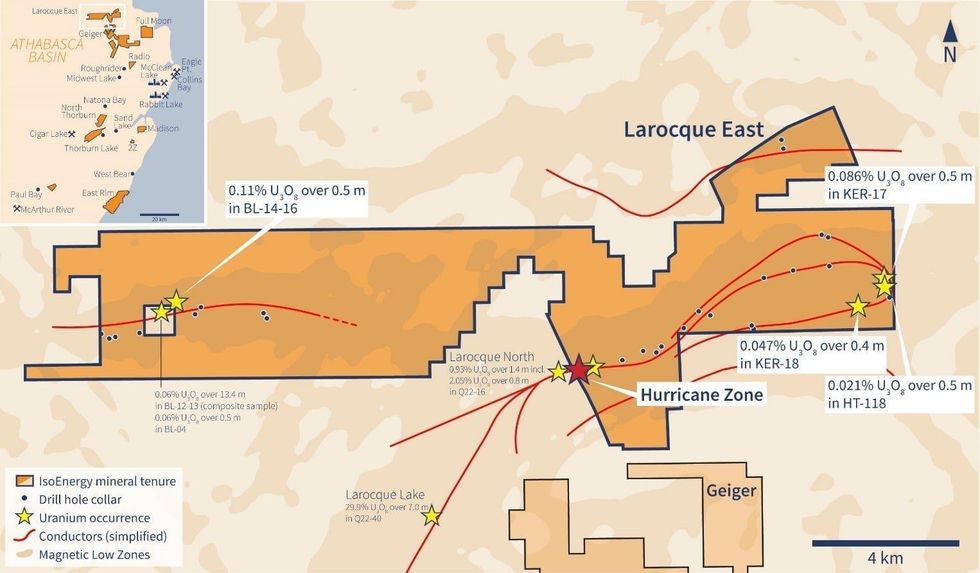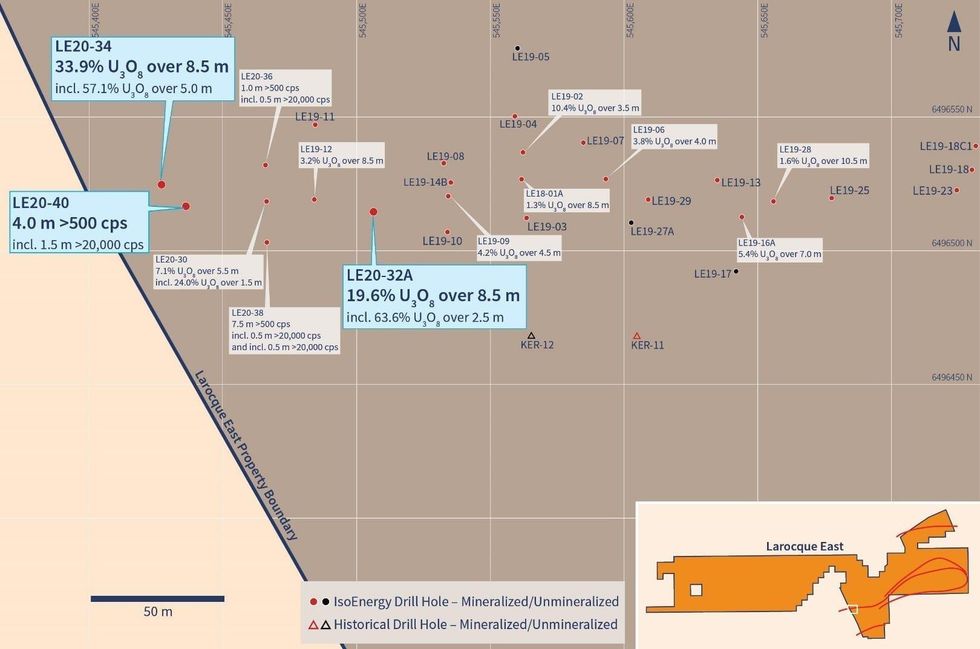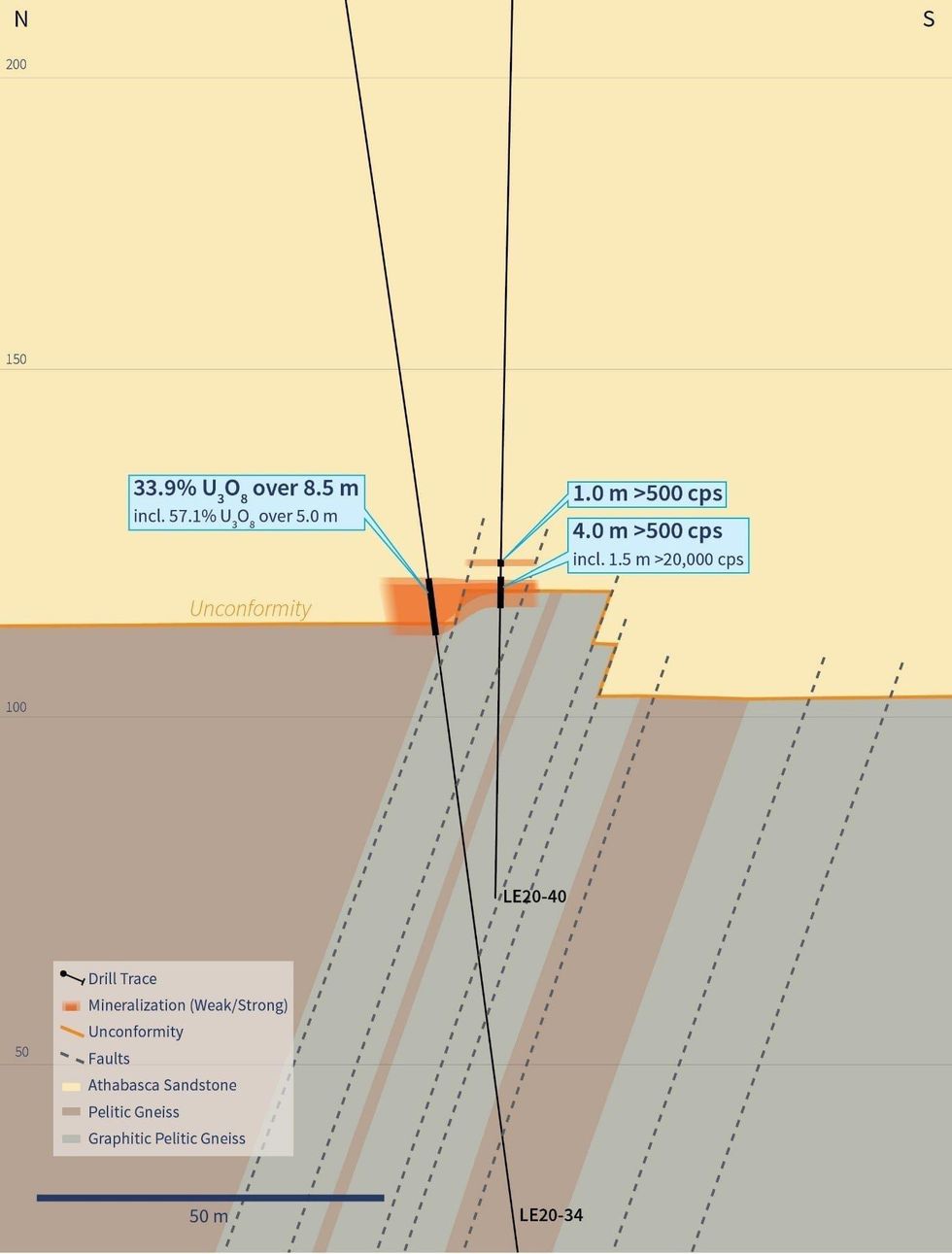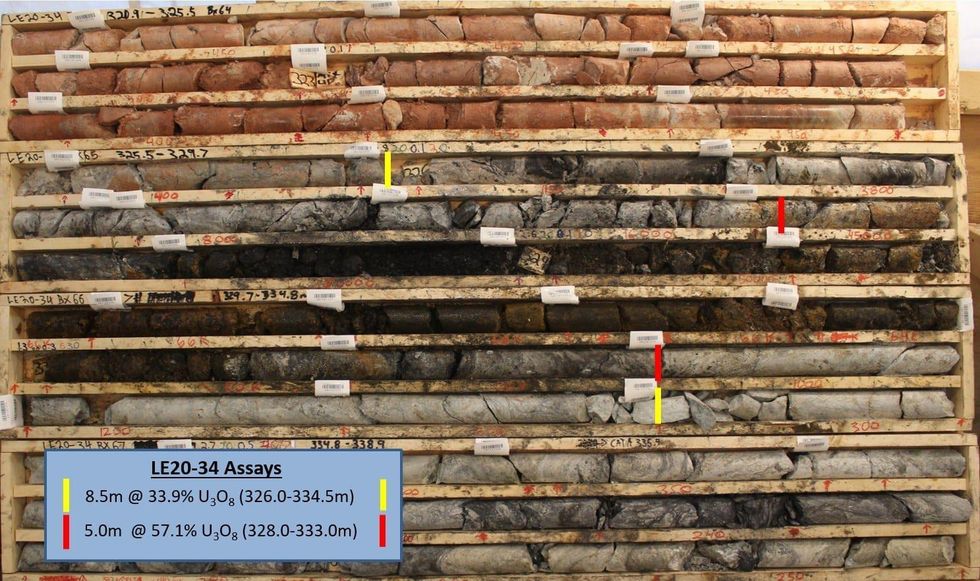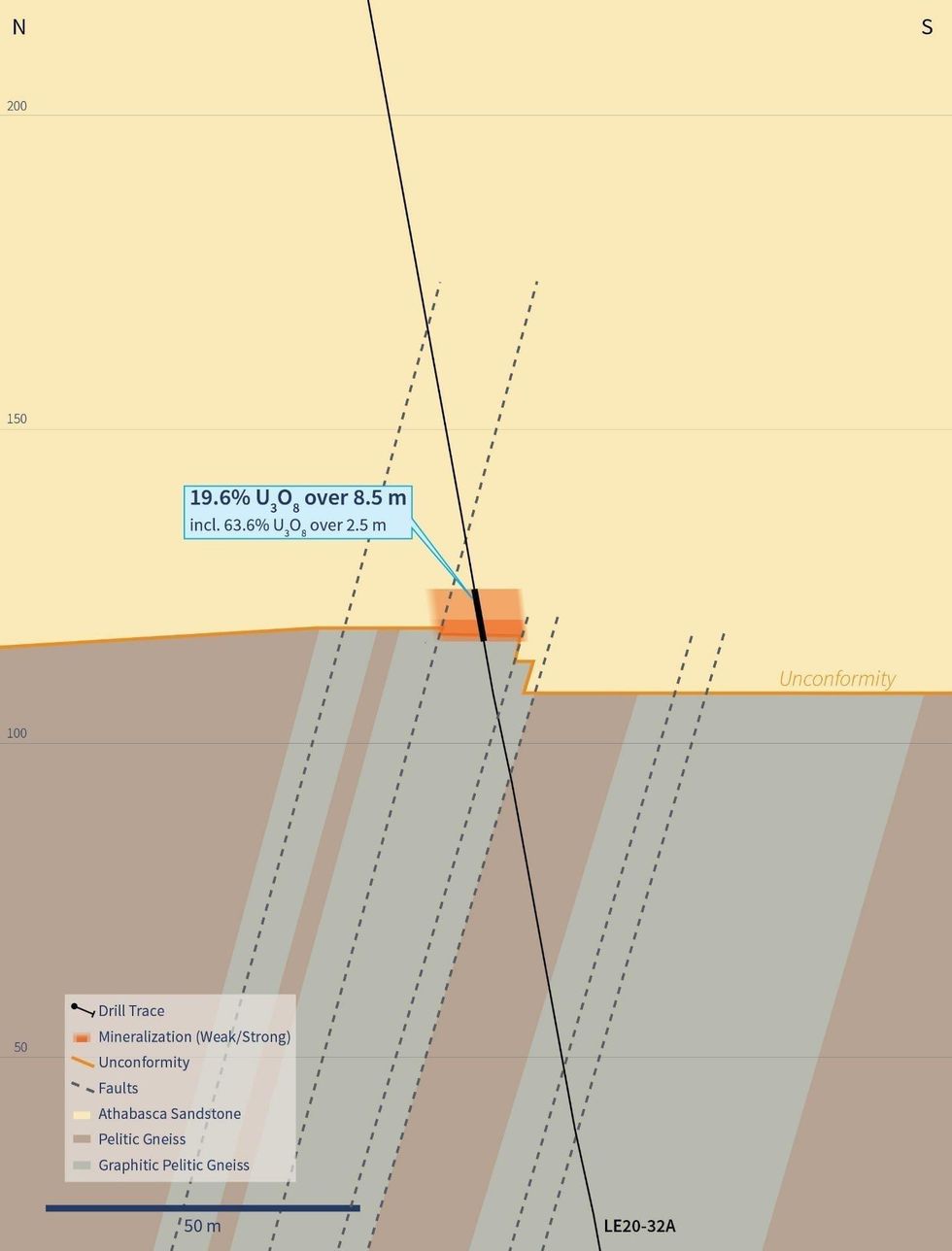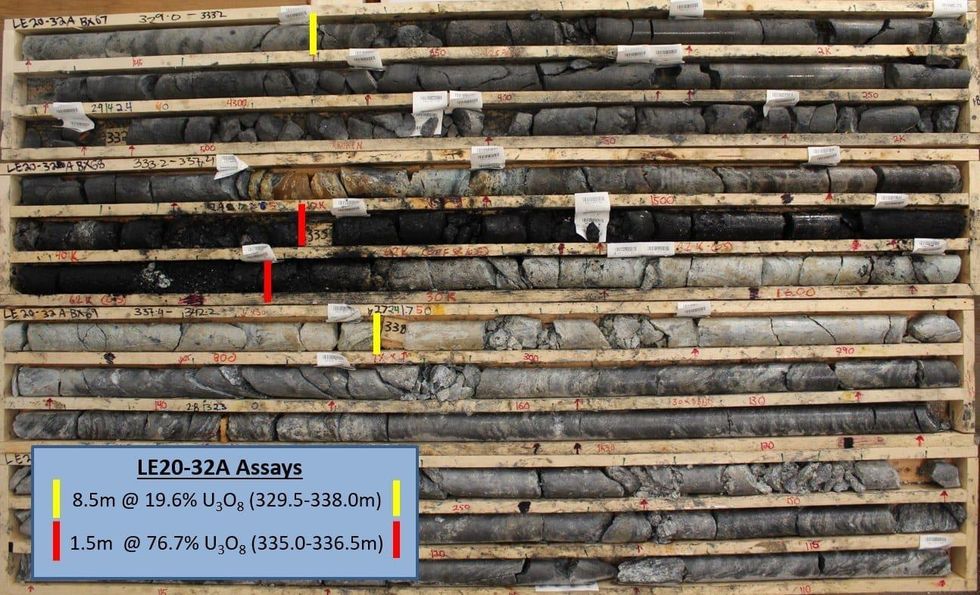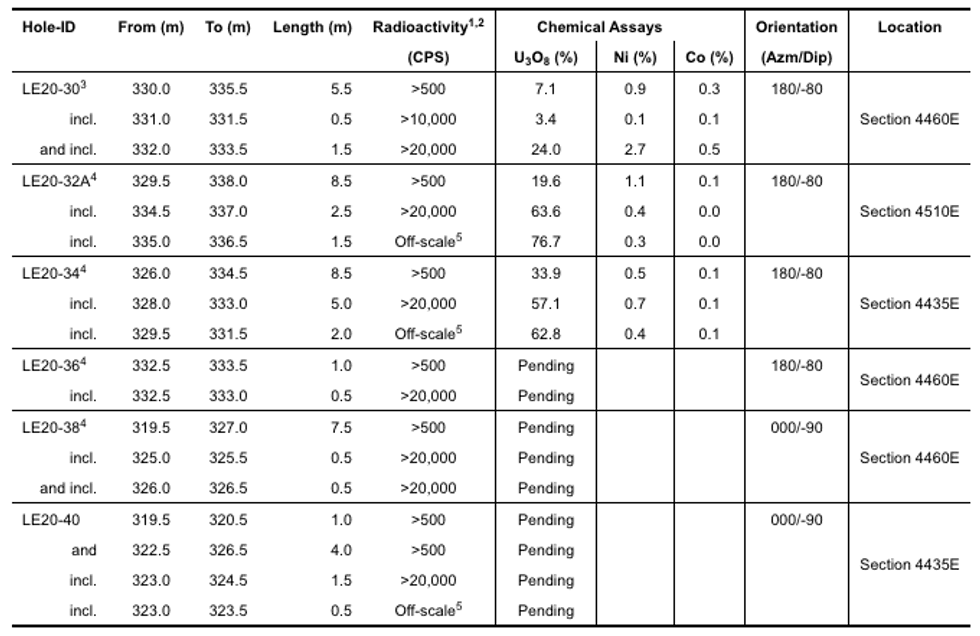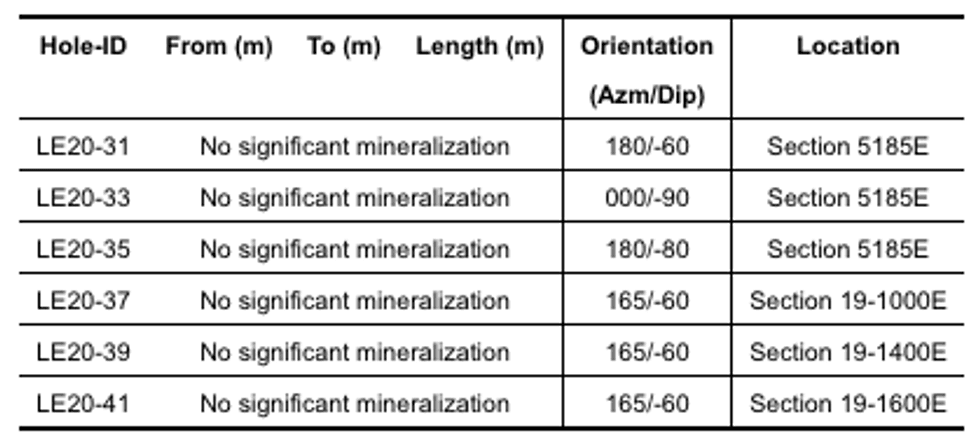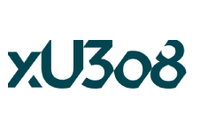IsoEnergy Intersects 8.5m of 33.9 Percent U3O8, Including 5.0m of 57.1 Percent U3O8 at the Hurricane Zone and Expands Drill Program
IsoEnergy reports chemical assays from two drill holes that intersected strong radioactivity early in the winter drilling program at the Hurricane zone.
IsoEnergy Ltd. (“IsoEnergy” or the “Company”) (TSXV:ISO, OTCQX:ISENF) is pleased to report chemical assays from two drill holes that intersected strong radioactivity early in the winter drilling program at the Hurricane zone. The Hurricane zone is a new discovery of high-grade uranium mineralization on the Company’s 100% owned Larocque East property (the “Property”) in the Eastern Athabasca Basin of Saskatchewan (Figure 1).
Highlights:
- Drill hole LE20-34 intersected 8.5m of uranium mineralization that averages 33.9% U3O8 from 326.0 to 334.5m, including 5.0m that averages 57.1% U3O8 from 328.0 to 333.0m. This is the strongest intercept drilled to date on the property.
- Drill hole LE20-32A intersected 8.5m of uranium mineralization that averages 19.6% U3O8 from 329.5-338.0m, including 2.5m that averages 63.6% U3O8 from 334.5-337.0m.
- The two drill holes are located on the west end of the Hurricane zone, approximately 75m apart.
- Due to the positive results to date, the drill program has been expanded by 4 drill holes to a total of 24 drill holes.
- The Company remains well-funded with over C$5 million in the treasury.
Figure 1 – Larocque East Property Map
Figure 2 – Western Hurricane Zone Drill Hole Location Map
Figure 3 – Cross Section 4435E (Drill Holes LE20-34 and LE20-40)
Figure 4 – Drill Hole LE20-34 Core Photo of Mineralization
Figure 5 – Cross Section 4510E
Figure 6 – Drill Hole LE20-32A Core Photo of Mineralization
Craig Parry, Chief Executive Officer commented: “The grades and thicknesses seen in these holes speak for themselves and justify an expansion to the current program. We’re approximately two-thirds of the way through this drill program and look forward to reporting additional results.”
Steve Blower, Vice President of Exploration commented: “Drill holes LE20-34 and LE20-32A intersections give us new insight into the controls on very high-grade uranium mineralization at Hurricane. Drill hole LE20-34, for example, is located at the junction of the “H” fault and the sub-Athabasca unconformity. That horizon has not been well drilled yet at Hurricane, suggesting that there is good potential for more mineralization like this.”
Drill Hole LE20-34 (Drill 1)
Drill Hole LE20-34 was drilled as a 25m step-out to the northwest of previously reported LE20-30 (5.5m @ 7.1% U3O8). It cored strongly altered sandstone before intersecting 8.5m of strong uranium mineralization averaging 33.9% U3O8 from 326.0 to 334.5m (Figures 2 and 3). The interval includes an extremely high-grade subinterval of 5.0m averaging 57.1% U3O8. Within this subinterval is a 2.0m length of semi-massive to massive black and brown pitchblende that is off-scale (>65,000CPS) on the RS-125 hand-held spectrometer (the “RS-125”) and averages 62.8% U3O8. Mineralization straddles the sub-Athabasca unconformity and is shown in a core photo in Figure 4. Table 1 summarizes the uranium mineralization intersected to date by Drill 1 in the current program.
Drill Hole LE20-32A (Drill 1)
Drill hole LE20-32A was completed to infill a 50m along-strike gap between 2019 mineralized drill holes LE19-09 (4.5m @ 4.2% U3O8) and LE19-12 (8.5m @ 3.2% U3O8). It intersected strongly altered sandstone before coring 8.5m of strong uranium mineralization that averages 19.6% U3O8 from 329.5 to 338.0m (Figures 2 and 5). Similar to LE20-34, the interval includes an extremely high-grade subinterval of 2.5m averaging 63.6% U3O8. Within this subinterval is a 1.5m length of semi-massive to massive black pitchblende that is off-scale on the RS-125 (>65,000CPS) and averages 76.7% U3O8. Figure 6 is a core photo showing the mineralized interval.
Drill Hole LE20-40 (Drill 1)
Drill hole LE20-40 was completed on section with drill hole LE20-34 to evaluate the extent of high-grade mineralization to the south of that drill hole. It successfully intersected 4.0m of uranium mineralization >500CPS (RS-125) from 322.5 to 326.5m, including 1.5m of very strong radioactivity and 0.5m that is off-scale on the RS-125 (Figures 2 and 3).
Drill Hole LE20-41 (Drill 2)
Drill 2 continues to deliver encouraging initial results well to the east of the current Hurricane zone footprint. Drill hole LE20-41 was completed as another under-cutting stratigraphic drill hole designed to locate favourable basement rocks and structures approximately 1.2km east of the eastern end of the Hurricane zone footprint. The hole was successful, as it intersected a thick package of highly graphitic basement rocks disrupted by brittle cataclastic faults. The up-dip projection of the structures to the unconformity will be targeted later in this program. Table 2 summarizes the drill holes completed to date by Drill 2.
Next Steps
Drill 1 remains on the west end of the Hurricane zone, continuing to infill the current footprint of the zone, extending the mineralization to the property boundary, and evaluating new targets generated by the results in drill holes LE20-32A and LE20-34. Drill 2 will continue to evaluate the potential to expand the zone to the east by following up on the brittle structures intersected at depth in undercutting stratigraphic drill holes LE20-37, 39 and 41. Further results of the program will be reported periodically throughout the winter drill season.
The Larocque East Property and the Hurricane Zone
The 100% owned Larocque East property consists of 20 mineral claims totaling 8,371 ha and is not encumbered by any royalties or other interests. Larocque East is immediately adjacent to the north end of IsoEnergy’s Geiger property and is 35 km northwest of Orano Canada’s McClean Lake uranium mine and mill.
Along with other target areas, the Property covers a 15-kilometre-long northeast extension of the Larocque Lake conductor system; a trend of graphitic metasedimentary basement rocks that is associated with significant uranium mineralization at the Hurricane zone, and in several occurrences on Cameco Corp.’s neighbouring property to the southwest of Larocque East. The Hurricane zone was discovered in July, 2018 and was followed up with a 12-hole drilling campaign in the winter of 2019 and a recently completed 17-hole summer 2019 drilling campaign. Dimensions are currently 550m along-strike, 40m wide and up to 10m thick. The zone is open for expansion along-strike and on most sections. Mineralization is polymetallic and commonly straddles the sub-Athabasca unconformity 320 m below surface. The best intersection to date is 33.9% U3O8 over 8.5m in drill hole LE20-34. Drilling at Cameco Corp.’s Larocque Lake zone on the neighbouring property to the southwest has returned historical intersections of up to 29.9% U3O8 over 7.0 m in drill hole Q22-040. Like the nearby Geiger property, Larocque East is located adjacent to the Wollaston-Mudjatik transition zone – a major crustal suture related to most of the uranium deposits in the eastern Athabasca Basin. Importantly, the sandstone cover on the Property is thin, ranging between 140 m and 330 m in previous drilling. In addition to the Hurricane zone discovery, four historical drill holes have intersected weak uranium mineralization at other locations on the Property to date.
Table 1 – Drill 1 2020 Hurricane Zone Results
Notes:
- Radioactivity is total gamma from drill core measured with an RS-125 hand-held spectrometer
- Measurements of total gamma on drill core are an indication of uranium content, but may not correlate with chemical assays
- Radioactivity and chemical assays previously disclosed
- Radioactivity previously disclosed
- Off-scale radioactivity is defined as exceeding 65,536 cps, the maximum measurable by an RS-125 spectrometer
Table 2 – Drill 2 2020 Larocque East Drilling Results
Qualified Person Statement
The scientific and technical information contained in this news release was prepared by Andy Carmichael, P.Geo., IsoEnergy’s Senior Geologist, who is a “Qualified Person” (as defined in NI 43-101 – Standards of Disclosure for Mineral Projects). Mr. Carmichael has verified the data disclosed. All radioactivity measurements reported herein are total gamma from an RS-125 hand-held spectrometer. As mineralized drill holes at the Hurricane zone are oriented very steeply (-80 to -90 degrees) into a zone of mineralization that is interpreted to be horizontal, the true thickness of the intersections is expected to be greater than or equal to 90% of the core lengths. This news release refers to properties other than those in which the Company has an interest. Mineralization on those other properties is not necessarily indicative of mineralization on the Company’s properties. All chemical analyses are completed for the Company by SRC Geoanalytical Laboratories in Saskatoon, SK. For additional information regarding the Company’s Larocque East Project, including its quality assurance and quality control procedures, please see the Technical Report dated effective May 15, 2019 on the Company’s profile at www.sedar.com.
About IsoEnergy
IsoEnergy is a well-funded uranium exploration and development company with a portfolio of prospective projects in the eastern Athabasca Basin in Saskatchewan, Canada. The Company recently discovered the high-grade Hurricane Zone of uranium mineralization on its 100% owned Larocque East property in the Eastern Athabasca Basin. IsoEnergy is led by a Board and Management team with a track record of success in uranium exploration, development and operations. The Company was founded and is supported by the team at its major shareholder, NexGen Energy Ltd.
Neither the TSX Venture Exchange nor its Regulations Services Provider (as that term is defined in the policies of the TSX Venture Exchange) accepts responsibility for the adequacy or accuracy of this release.
This news release shall not constitute an offer to sell or a solicitation of any offer to buy any securities, nor shall there be any sale of any securities in any jurisdiction in which such offer, solicitation or sale would be unlawful. The securities referenced herein have not been, nor will they be, registered under the United States Securities Act of 1933, as amended (the “U.S. Securities Act”), and such securities may not be offered or sold within the United States absent registration under the U.S. Securities Act or an applicable exemption from the registration requirements thereunder.
Forward-Looking Information
The information contained herein contains “forward-looking statements” within the meaning of the United States Private Securities Litigation Reform Act of 1995 and “forward-looking information” within the meaning of applicable Canadian securities legislation. “Forward-looking information” includes, but is not limited to, statements with respect to the activities, events or developments that the Company expects or anticipates will or may occur in the future, including, without limitation, planned exploration activities. Generally, but not always, forward-looking information and statements can be identified by the use of words such as “plans”, “expects”, “is expected”, “budget”, “scheduled”, “estimates”, “forecasts”, “intends”, “anticipates”, or “believes” or the negative connotation thereof or variations of such words and phrases or state that certain actions, events or results “may”, “could”, “would”, “might” or “will be taken”, “occur” or “be achieved” or the negative connotation thereof.
Such forward-looking information and statements are based on numerous assumptions, including among others, that the results of planned exploration activities are as anticipated, the price of uranium, the anticipated cost of planned exploration activities, that general business and economic conditions will not change in a material adverse manner, that financing will be available if and when needed and on reasonable terms, that third party contractors, equipment and supplies and governmental and other approvals required to conduct the Company’s planned exploration activities will be available on reasonable terms and in a timely manner. Although the assumptions made by the Company in providing forward-looking information or making forward-looking statements are considered reasonable by management at the time, there can be no assurance that such assumptions will prove to be accurate.
Forward-looking information and statements also involve known and unknown risks and uncertainties and other factors, which may cause actual events or results in future periods to differ materially from any projections of future events or results expressed or implied by such forward-looking information or statements, including, among others: negative operating cash flow and dependence on third party financing, uncertainty of additional financing, no known mineral reserves or resources, the limited operating history of the Company, the influence of a large shareholder, alternative sources of energy and uranium prices, aboriginal title and consultation issues, reliance on key management and other personnel, actual results of exploration activities being different than anticipated, changes in exploration programs based upon results, availability of third party contractors, availability of equipment and supplies, failure of equipment to operate as anticipated; accidents, effects of weather and other natural phenomena and other risks associated with the mineral exploration industry, environmental risks, changes in laws and regulations, community relations and delays in obtaining governmental or other approvals.
Although the Company has attempted to identify important factors that could cause actual results to differ materially from those contained in the forward-looking information or implied by forward-looking information, there may be other factors that cause results not to be as anticipated, estimated or intended. There can be no assurance that forward-looking information and statements will prove to be accurate, as actual results and future events could differ materially from those anticipated, estimated or intended. Accordingly, readers should not place undue reliance on forward-looking statements or information. The Company undertakes no obligation to update or reissue forward-looking information as a result of new information or events except as required by applicable securities laws
Click here to connect with IsoEnergy Ltd. (TSXV:ISO) for an Investor Presentation.
